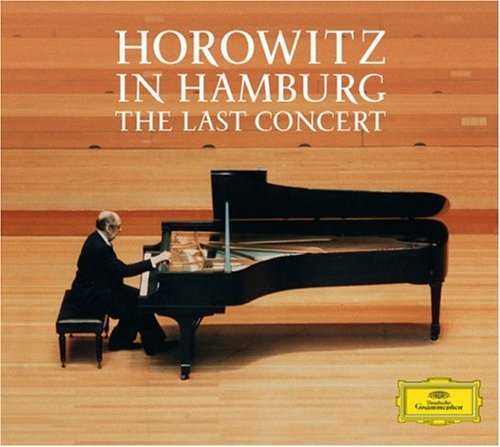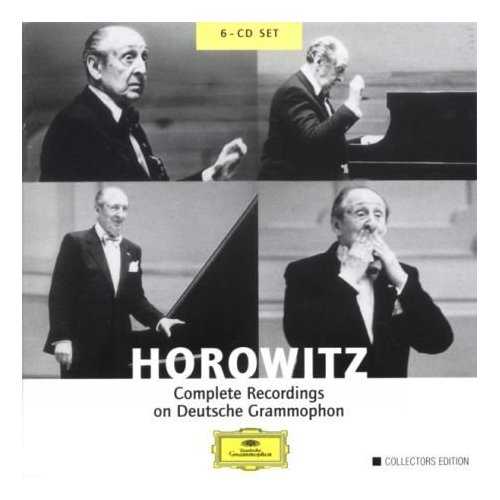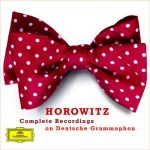
Audio CD
Number of Discs: 1
Format: APE (image+cue)
Label: Deutsche Grammophon
Size: 250 MB
Recovery: +3%
Scan: yes
Wolfgang Amadeus Mozart
01. Rondo for Piano no 1 in D major, K 485
02. Sonata for Piano no 13 in B flat major, K 333 (315c): 1st movement, Allegro
Franz Liszt / Wolfgang Amadeus Mozart
03. Sonata for Piano no 13 in B flat major, K 333 (315c): 2nd movement, Andante cantabile
Wolfgang Amadeus Mozart / Robert Schumann
04. Sonata for Piano no 13 in B flat major, K 333 (315c): 3rd movement, Allegretto grazioso
Frédéric Chopin / Franz Liszt
05. Soirées de Vienne (9) after Schubert, S 427: no 6
Frédéric Chopin / Robert Schumann
06. Kinderszenen, Op. 15: no 1, Von fremden Ländern und Menschen
Franz Schubert / Robert Schumann
07. Kinderszenen, Op. 15: no 2, Curiose Geschichte
Moritz Moszkowski / Robert Schumann
08. Kinderszenen, Op. 15: no 3, Haschemann
09. Kinderszenen, Op. 15: no 4, Bittendes Kind
10. Kinderszenen, Op. 15: no 5, Glückes genug
11. Kinderszenen, Op. 15: no 6, Wichtige Begebenheit
12. Kinderszenen, Op. 15: no 7, Träumerei
13. Kinderszenen, Op. 15: no 8, Am Kamin
14. Kinderszenen, Op. 15: no 9, Ritter von Steckenpferd
15. Kinderszenen, Op. 15: no 10, Fast zu ernst
16. Kinderszenen, Op. 15: no 11, Fürchtenmachen
17. Kinderszenen, Op. 15: no 12, Kind im Einschlummern
18. Kinderszenen, Op. 15: no 13, Der Dichter spricht
Frédéric Chopin
19. Mazurkas (4) for Piano, B 115/Op. 33: no 4 in B minor
20. Polonaise for Piano in A flat major, B 147/Op. 53 ‘Heroic’
First-ever release in any format of this momentous musical event! In 1987, Vladimir Horowitz, the last of the keyboard titans of the 20th century, made a triumphant European tour, giving what turned out to be his final series of performances before an adoring public. The very last of these concerts, on June 21 in Hamburg, was recorded by the North German Radio. Apart from a single encore, no part of this valedictory concert has ever been issued before. This recording constitutes a unique souvenir of Horowitz’s final public appearance, where the sense of occasion and immediacy is palpable. Horowitz included three signature works on his final program: Schumann’s enchanting Scenes from Childhood (source of one of his favorite encores, the immortal Träumerei), Chopin’s monumental “Heroic” Polonaise, and one of his most glittering encores, Moszkowski’s Étincelles. Over a career lasting nearly seven decades, Horowitz’s recordings have sold over three million units and won 25 Grammy® Awards (six for his Deutsche Grammophon titles)
Best for the completist, or for the sake of sentiment
Horowitz’s late period, which roughly coincides with his switch from Sony to DG, could be embraced by the title of a review here: the long goodbye. The electricity that characterized every note in the early phase now flashed intermittently. One can appreciate how Horowitz dropped almost everything that critics had called a mannerism, and I think part of his new-found love for Mozart (and Clementi, whose music he devoured but didn’t record much of – four sonatas is all that I can find in stereo) was based on the simplicity the pianist could now bring. With age came a tendency to program shorter works, and old favorites were often, but not always, done with less risk and flash.
To be blunt, these changes made me think that DG got the worst of the deal compared to the fiery legacy found on EMI, RCA, and Columbia/Son, which recorded Horowitz in roughly chronological order. but my respect for Hank Drake, Amazon’s dedicated Horowitz expert, inspired me to look again. I responded to the poetry that Horowitz had distilled from his decades with his favorite composers, and even wisdom. On those grounds, his last recital from a rainy Sunday in June 1987 in Hamburg offers some moving moments. Parts of Kinderszene, the Chopin Mazurka, and the opening Mozart Rondo lifted my spirits. The Polonaise is best forgotten; it is punchy and lacking in passion.
I saw a film recently in which Horowitz’s widow Wanda recalls that at a certain point – she doesn’t give a date – he gave up his lifelong routine of practicing three or four hours every day (even Horowitz got to Carnegie Hall that way) and reduced it to forty minutes. Perhaps he sensed that the long farewell was underway. I was wrong to generalize about the DG recordings; at the very least everyone should own the historic return to Moscow, a deeply moving event for the entire musical world, and beyond. This last recital is not as riveting as the Berlin recital from the summer before. In 1986 Horowitz showed considerably more fire (with some lapses), and that concert, released in a 2-CD set by Sony, offers richer piano sound than the DG, which was locally recorded by North German Radio in quite ordinary sound. It also helps that the Berlin recital sells very cheaply on the used market.
A Fond Farewell
For those familiar with Vladimir Horowitz’s televised recital from Vienna a few weeks prior to this one, both the repertoire and the manner of performance will be similar. There are a few differences in details, which mainly spring from the differences between Vienna’s Golden Hall and Hamburg’s Music Hall, which is “dryer” acoustically.
By 1987, Horowitz had stripped his playing of much of the artifice which marred the performances he gave while in his 70s. Gone were the bizarre rubati and general obliteration of structure, and in their place was an unforced spontaneity and balance between tension and relaxation. A case in point is Schumann’s Scenes from Childhood, which Horowitz recorded several times. Horowitz’s two studio renderings, from 1950 and 1962, are fairly straightforward accounts, with occasional lapses into pianistic micromanagement and hints of nervousness when there should be relaxation. A 1982 live recording is almost the opposite, with nonsensical rubatos, distended ritards, slack rhythm, and almost no coherence. But here, in 1987, Horowitz has pulled himself together and plays with simplicity, controlled freedom, and conviction. It is often said that the elderly sometimes return to a childlike state. In old age, Horowitz had achieved communion with Schumann’s visions of childhood lost. Horowitz still dared, however, to look beyond the printed page and interpret the music. Few pianists have ever dared to make Chopin’s Mazurka in B Minor sound so sassy and sexy.
As far as technical matters go, Horowitz’s fingers are fully up to the task of his chosen repertoire. By now, the octogenarian realized he was no longer capable of sustained virtuoso fireworks, so he often substituted finesse and coloration for bravura. The balance and evenness of his passagework, his incredible control of lower levels of dynamics, and ear for pedaling remain unrivaled. There are, however, tiny memory lapses which occur during the early part of the concert (and in almost the exact same places as occurred in his Vienna concert). However, these are not greatly distracting and can be easily forgiven, and they are nowhere near as pronounced as those I witnessed at Claudio Arrau’s last Boston recital. Only note perfect pedants will cry foul.
DG includes a note indicating that one work, Schubert’s Impromptu, D 899, No. 3 was not included in the broadcast or this recording due to technical reasons. However, my understanding is that it was omitted due to an audience member who became ill and had to leave, which created a noisy distraction.
Copies of this recital, which was broadcast, have been circulating among collectors for years. However, radio broadcasts are typically compressed and this was no exception. For this release, DG has gone to the uncompressed master tape, which sounds entirely natural, with ideal microphone placement that brings Horowitz into the room. So, even if you have the “pirate” tape, it’s well worth getting this CD.
An Important Memento
Vladimir Horowitz is one of the greatest pianists to ever live. For pianists who embrace things pianistic in the repertoire, he is immortal. For those whose credo is different, he often is still a huge force to be reckoned with. Therefore, listening to his last public performance is an act practically required of a musician who finds it important to follow this fascinating career and life completely to the end. Horowitz’s musical ideas, his inspirations, and the tone he brings from the piano are present, full-force, in this recital, and much of his playing is less mannered and more to-the-point than his other renditions of these same works. In addition to that, he is more tired, weaker, stiffer, and less accurate than other late performances I have heard. Whether you are new to Horowitz, or have eagerly sought out every note he has played for many years, buy this disc as an hommage to an immortal, and become acquainted with his other recordings of the same repertoire. This great pianist has had an effect on virtually every artist who has heard him.




Gracias!
Thanks!
Thanks, indeed!
Muchas Gracias!
Thanks
Gracias, muchas gracias.